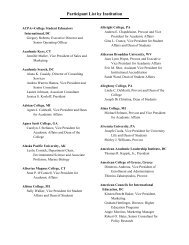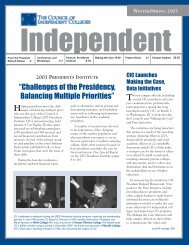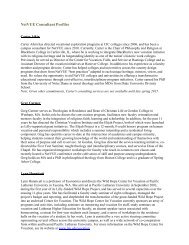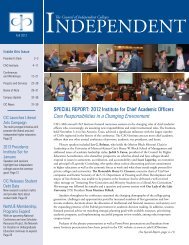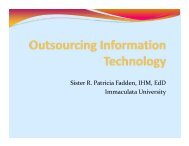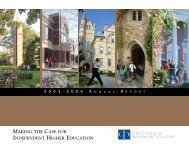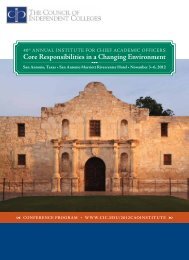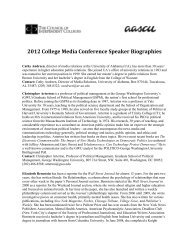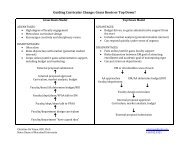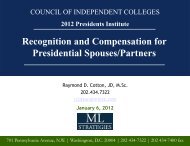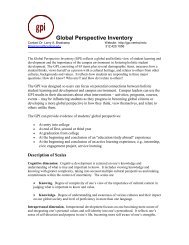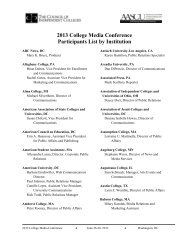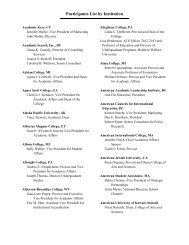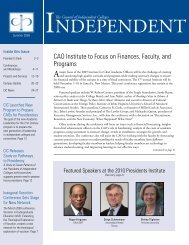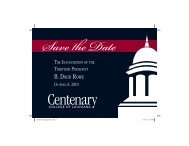Meeting the Challenge: - The Council of Independent Colleges
Meeting the Challenge: - The Council of Independent Colleges
Meeting the Challenge: - The Council of Independent Colleges
Create successful ePaper yourself
Turn your PDF publications into a flip-book with our unique Google optimized e-Paper software.
Welch Suggs<br />
• College/Community Partnerships (1993-1999)<br />
• Implementing Urban Missions (1997-2001)<br />
• Engaging Communities and Campuses (1998-2005)<br />
Helping institutional leaders obtain information that<br />
can be useful in decision-making is ano<strong>the</strong>r long-standing<br />
area <strong>of</strong> interest for CIC. <strong>The</strong> concern that colleges have good<br />
data for institutional research dates back to <strong>the</strong> Institutional<br />
Research and Planning Project <strong>of</strong> 1972, a three-year initiative<br />
for which CASC secured $900,000 in grants from <strong>the</strong> U.S.<br />
Department <strong>of</strong> Health, Education, and Welfare to help<br />
colleges set up <strong>of</strong>fices <strong>of</strong> institutional research.<br />
Ano<strong>the</strong>r early CASC initiative was Advancing<br />
Quality Education. One <strong>of</strong> its components involved<br />
administering voluntary standardized tests at CASC member<br />
institutions to track <strong>the</strong> preparation <strong>of</strong> students in <strong>the</strong>ir<br />
sophomore and senior years, and <strong>the</strong>n comparing <strong>the</strong> results<br />
to those <strong>of</strong> similar students at o<strong>the</strong>r kinds <strong>of</strong> institutions.<br />
<strong>The</strong> second component was a survey <strong>of</strong> <strong>the</strong> business practices<br />
<strong>of</strong> small colleges. Toge<strong>the</strong>r, <strong>the</strong> two components established<br />
that CASC members were similar to o<strong>the</strong>r small colleges in<br />
<strong>the</strong>ir financial administration and student achievements. <strong>The</strong><br />
results also gave <strong>the</strong> organization a benchmark to evaluate<br />
later experiments and measure deviations from <strong>the</strong> norm.<br />
Data-informed decision-making is becoming<br />
increasingly vital at institutions with limited budgets and<br />
sharply rising costs. In 2002, CIC initiated a series <strong>of</strong> Data<br />
and Decisions Workshops in partnership with <strong>the</strong> Association<br />
for Institutional Research to train college teams to acquire<br />
and make use <strong>of</strong> institutional and comparative data to<br />
inform campus decision-making. <strong>The</strong> Data and Decisions<br />
Workshops are funded by <strong>the</strong> National Center for Education<br />
Statistics.<br />
In 2004, with assistance from <strong>The</strong> William Randolph<br />
Hearst Foundations, CIC developed <strong>the</strong> Key Indicators Tool<br />
to benchmark data on students, faculty, and finances for<br />
2001<br />
CIC announces a new strategic plan and grants <strong>the</strong> first Heuer<br />
Awards for Outstanding Achievement in Undergraduate Science<br />
Education. <strong>The</strong> <strong>Council</strong> launches <strong>the</strong> Teaching Scholar Partnerships<br />
Program to assist institutions to improve ma<strong>the</strong>matics, science,<br />
and technology education in K-12 classrooms; and Presidential<br />
Leadership Services to streng<strong>the</strong>n college and university leadership.<br />
83



